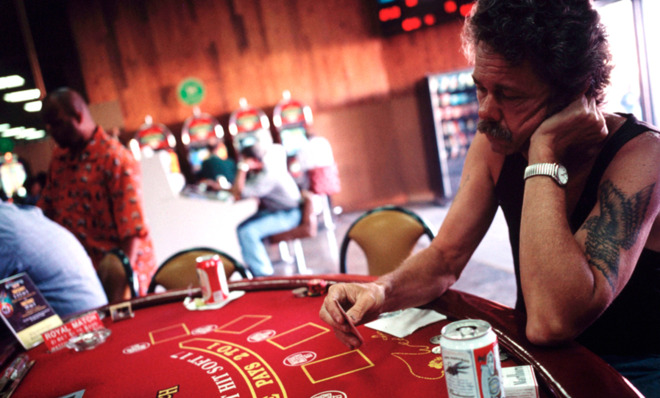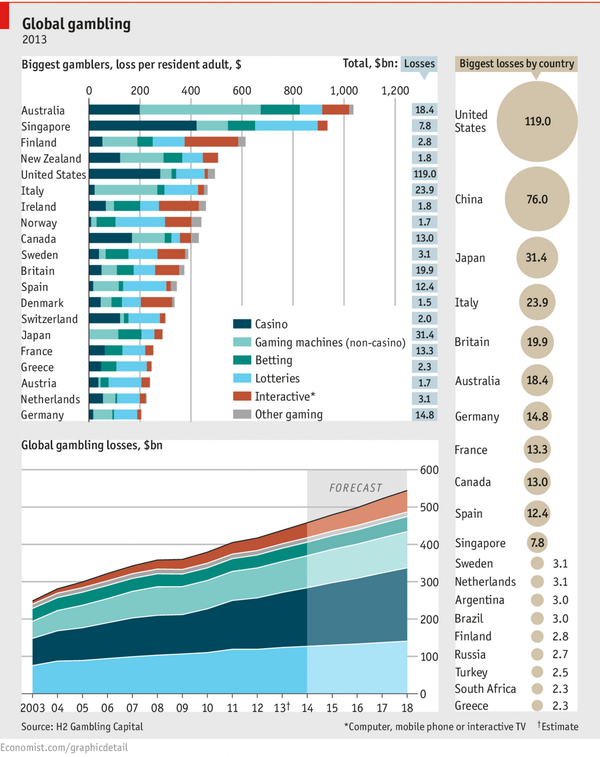How did Americans manage to lose $119 billion gambling last year?
The world lost a record of amount of money last year, and America led the pack

A free daily email with the biggest news stories of the day – and the best features from TheWeek.com
You are now subscribed
Your newsletter sign-up was successful
The gambling industry around the world is huge, but the biggest market is the United States, where gamblers lost a staggering $119 billion in 2013:

That's a crazy amount of money; more money than Bill Gates has (with $72 billion) or Warren Buffett (with $58 billion), and only $11 billion less than the two men put together.
The Week
Escape your echo chamber. Get the facts behind the news, plus analysis from multiple perspectives.

Sign up for The Week's Free Newsletters
From our morning news briefing to a weekly Good News Newsletter, get the best of The Week delivered directly to your inbox.
From our morning news briefing to a weekly Good News Newsletter, get the best of The Week delivered directly to your inbox.
What intrigues me is the question of why so many people gamble. After all, everyone knows that the odds are stacked against gamblers, whether they're betting on slot machines, horse racing, football, roulette, bingo, or lotteries. Even the games where it is possible for a highly skilled player to consistently make money — blackjack and poker — are big losers for the vast majority of players. And why do some players — problem gamblers, around 1.8 percent of the population — end up losing vast amounts of money, going into debt, and sometimes even losing their families and homes?
Different individuals gamble for a mixture of different reasons. The reasons are subtly different for each individual, but are usually a mixture of the following:
1. Escapism, entertainment, and boredom: The places that people go to gamble — like casinos, hotels, card rooms, bookmakers, and even online gaming websites — offer an escape from everyday life, and the opportunity to do something different, usually with a possibility of hitting a large payday. The vast majority of people who play the lottery don't win, but they all get the opportunity to dream about what they would do if they did win. In this sense, gambling can be seen as a form of entertainment, and those multi-billion dollar losses are the cost of being entertained, just as people pay to watch sports, listen to music, or play computer games.
2. Social activity: Gambling is a deep rooted part of American culture — 80 percent of Americans gamble at least once per year. Gambling with friends and family — whether that's in a casino in Vegas, or a card game at home, or making football or basketball bets among work colleagues — is widespread.
A free daily email with the biggest news stories of the day – and the best features from TheWeek.com
3. Excitement and thrill: The sense of anticipation and risk creates an adrenaline rush and the payoff releases a surge of dopamine. Dopamine is a neurotransmitter associated with the feeling of pleasure, and even elation. When you receive a hug from a loved one, dopamine levels rise; when you engage in sex, dopamine levels spike; when you win a bet, they shoot up as well.
4. Self-esteem: Casinos roll out the red carpet and dish out complimentary drinks, free stays in suites, shopping vouchers, and other gifts for big-time gamblers. That can be a huge self-esteem boost. So too can giving away winnings to friends or family, tipping service staff large amounts, or making gifts to charity.
5. Self-delusion and the Dunning-Kruger Effect: Some gamblers believe they are lucky or special and will beat the odds and win, unlike the vast majority of gamblers. While this is true in the long run for a very tiny minority of sharp, mathematical gamblers in certain games like poker and blackjack — just as it is possible for a tiny minority of investors to beat the stock market — it is untrue for the overwhelming majority of players. Inexperienced gamblers (and investors) may fall victim to the Dunning-Kruger Effect — the tendency for unskilled individuals to overrate their skill and ability, and underrate the difficulty of the task at hand. They may also create narrative fallacies and rationalizations to justify their belief that they can beat the odds and win.
So that covers the behavior of many casual gamblers, but for problem bettors, the issue is often addiction. The primary addiction, however, may not always be to the rush of winning — some research suggests that gamblers get the biggest kick from coming close to winning, and then losing. And some gamblers may be addicted to the aforementioned escapism or self-esteem highs.
The global gambling industry forecasts that betting losses will continue to rise. And they're probably right. After all, it's been common knowledge for a very long time that most people lose at gambling in the long run. That's what keeps casinos in business. And yet, people keep keeping them in business.
John Aziz is the economics and business correspondent at TheWeek.com. He is also an associate editor at Pieria.co.uk. Previously his work has appeared on Business Insider, Zero Hedge, and Noahpinion.
-
 Democrats push for ICE accountability
Democrats push for ICE accountabilityFeature U.S. citizens shot and violently detained by immigration agents testify at Capitol Hill hearing
-
 The price of sporting glory
The price of sporting gloryFeature The Milan-Cortina Winter Olympics kicked off this week. Will Italy regret playing host?
-
 Fulton County: A dress rehearsal for election theft?
Fulton County: A dress rehearsal for election theft?Feature Director of National Intelligence Tulsi Gabbard is Trump's de facto ‘voter fraud’ czar